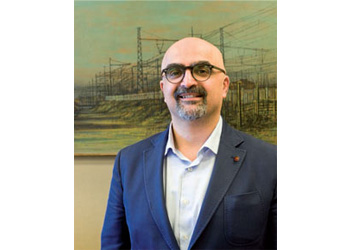100 days on the job

I assumed this position on 1 February and since then I have had meetings with over 160 people – from the two Armenian Catholicoi (the heads of the Church) and government ministers to civil society activists and students. I listened to the opinions of various intellectuals and academics, heard the needs of school principals and teachers (I must have visited at least 20 Armenian schools!), talked to university rectors and attended meetings with Armenian community leaders in six countries: Armenia, Lebanon, Turkey, France, Britain and the USA (East and West coasts). One of my predecessors (Vahram Mavian) had entitled his marvellous book: “There are Armenians everywhere!” Indeed there are, and I had to meet at least some of them to have a better idea of their expectations from the Gulbenkian Foundation.
One of my most important tasks as the new Director is to develop a forward looking programming plan based on which we can focus our work, select projects and implement initiatives. I did not want to develop such a programme in a vacuum, without consulting the Armenian communities which we strive to support. For our programmes to be successful, they need to reflect actual needs. The trips not only provided learning and strategising opportunities for me, they also enabled me to build (and rebuild) bridges, establish a wide array of contacts, explain developments at the Foundation to the Armenian media and, of course, to assess needs. I sensed quite a bit of excitement within the global Armenian community, from Yerevan to Los Angeles, about the changes and renewal within the Armenian Communities Department.
Over the next couple of months I will be writing up our programming plan so we can start its implementation in the Fall of 2013. During my travels I realised that the Department’s “signature” programme has been its university scholarships. Scores of individuals – some of them prominent leaders – came up to me to say that they managed to attend university thanks to a grant from the Armenian Communities Department. So a revamped version of that programme will be reintroduced. I also came to realise how precarious of a situation Western Armenian language is in (this is the branch of Armenian that Calouste Gulbenkian spoke). UNESCO has classified it as an endangered language. We should support initiatives that reinforce it. Helping the rich and historically deep Armenian culture enter the digital age – through on line publications, apps, interactive e-books and the like – is also essential. In Armenia, I realised how vital it is to support civil society, particularly civic education, as well as encouraging links between scholars and students in Armenia and the Western world. And in Istanbul I met some brave and committed people and organisations who are at the forefront of Armenian-Turkish dialogue initiatives, as well as the further democratisation of that country. It is critical to support them if there is to be any progress in the long-term reconciliation of the two peoples.
We will of course share our programme with the wider public in due course so that everyone will see the bases on which we take our funding decisions. We will never be able to support all the requests for funding we receive, but we do need to be transparent, consistent and fair in our decisions. I invite you to visit our website September onwards for new announcements and updates.
There is no shortage of ideas and possible initiatives. However, translating these into concrete programmes is not going to be easy. The greatest challenge I faced – and will continue to face – is convincing partners of the importance of the new principles based on which our projects are going to be managed: results-based, time specific, accountable with ongoing reporting and evaluation. Changing habits and expectations is hard; it requires a lot of time and patience!
In addition to my travels and many external consultations, I have also had the chance to meet many wonderful colleagues with whom I have been exploring various possibilities for joint events and initiatives here at the Foundation. In my view, part of my Department’s mandate should be to bring Armenian culture, music and history to Portugal. As one Portuguese colleague put it to me, “we know Calouste Gulbenkian was Armenian, but we don’t really know who the Armenians are….” I will not promise Armenian history lessons, but I will try my hardest to have periodic Armenian-related events at the Foundation next year onwards.
To end on a more personal note, what a wonderful city to be in! I have been enjoying the food, the sites, the history, the music (both at Gulbenkian and in Alfama!) and, most of all, the friendly people of Portugal. I am looking forward to many years of fruitful engagement both in the Portuguese and Armenian worlds!
Razmik Panossian
Director of Armenian Communities Department
June 2013
Please click here to read the text in Armenian.
